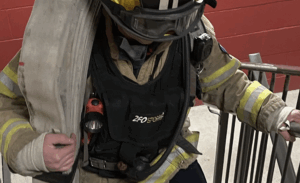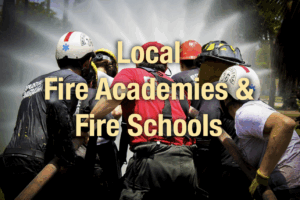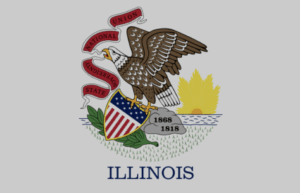If you’ve made it to the interview stage of the firefighter hiring process, congratulations — that likely means you’ve already passed the written and physical tests. But don’t get too comfortable just yet.
Many candidates underestimate the power of the oral interview — and that’s a major mistake.
Even top scorers on the written and physical tests can fail to move forward because they didn’t prepare properly for the interview phase. Don’t let that happen to you.
In fact, some fire departments base their entire hiring decision on the oral interview alone. It’s not uncommon for a department to skip their own written or physical ability tests, requiring only EMT/paramedic certifications, Firefighter I & II credentials, and CPAT, then hiring candidates solely based on their performance in the oral interview.
If your dream department follows this structure, mastering your interview is non-negotiable. That’s why you need to know the #1 firefighter interview trick.
The #1 Firefighter Interview Trick: Master the 3-Minute “Who Are You” Pitch
No Lie!
Many interviews begin with one of the most important and predictable questions: “Tell us about yourself.” They will always ask this question in some form and usually it’s the first thing they ask.
Don’t be caught off guard by it. This isn’t a throwaway question — it’s your golden opportunity to set the tone for the interview and leave a lasting impression.
The best firefighter interview trick? Develop and practice a 3-minute personal pitch that answers who you are, what motivates you, and why you want to be a firefighter, particularly for their department.
Use this time to showcase your story, your passion, and what makes you unique.
What is a 3-Minute Pitch?
In business, a 3-minute pitch is used to sell a product or idea. In the firefighter interview, you are the product — and your pitch should highlight who you are, what you’ve done, and why you’re the right fit.
Use the following prompts to build your story:
- Where did you grow up? What shaped you?
- Was there a pivotal moment that inspired you to become a firefighter?
- What community service or volunteer work have you done?
- What education, certifications, or KSAs (knowledge, skills, and abilities) do you bring to the table?
Tips for a Strong 3-Minute Pitch:
- Tell a memorable story that makes you stand out.
- Write your pitch down in your own words.
- Practice until it feels natural. Recite it while driving, in the shower, or in front of a mirror.
- Record and review yourself to refine your delivery.
- Avoid sounding robotic — let your personality shine through.
Simply Copy and Fill Out The 3-Minute Pitch Forms and Practice
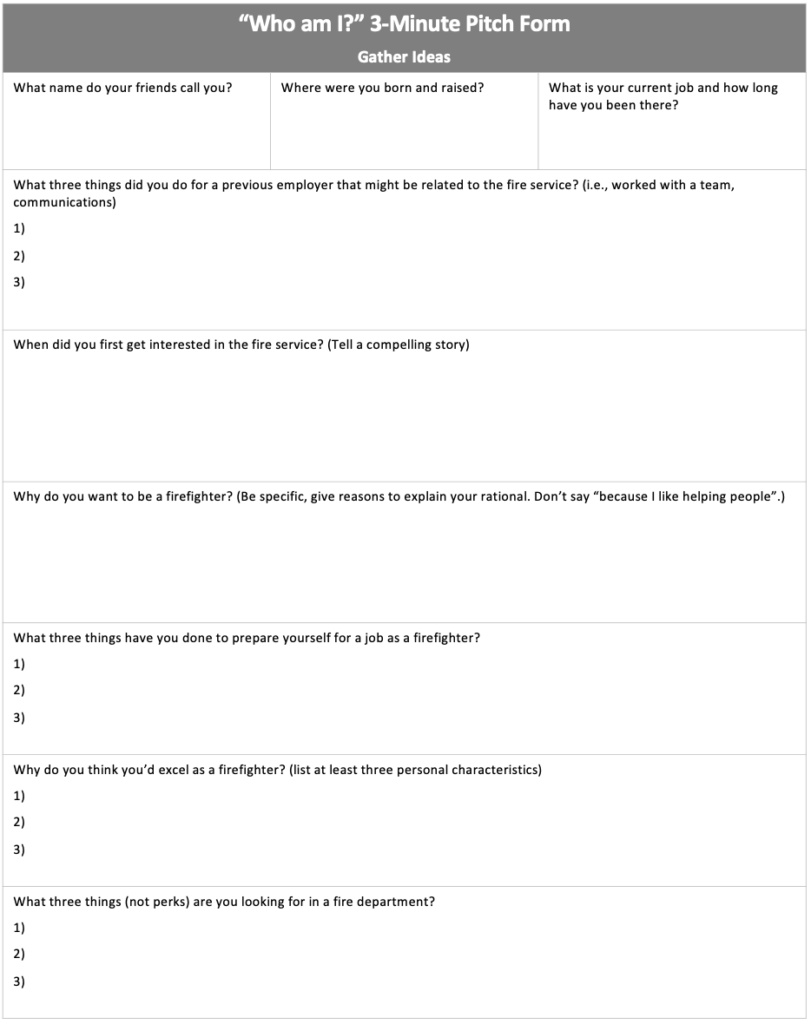
- Tell a memorable story that makes you stand out.
- Write your pitch down in your own words.
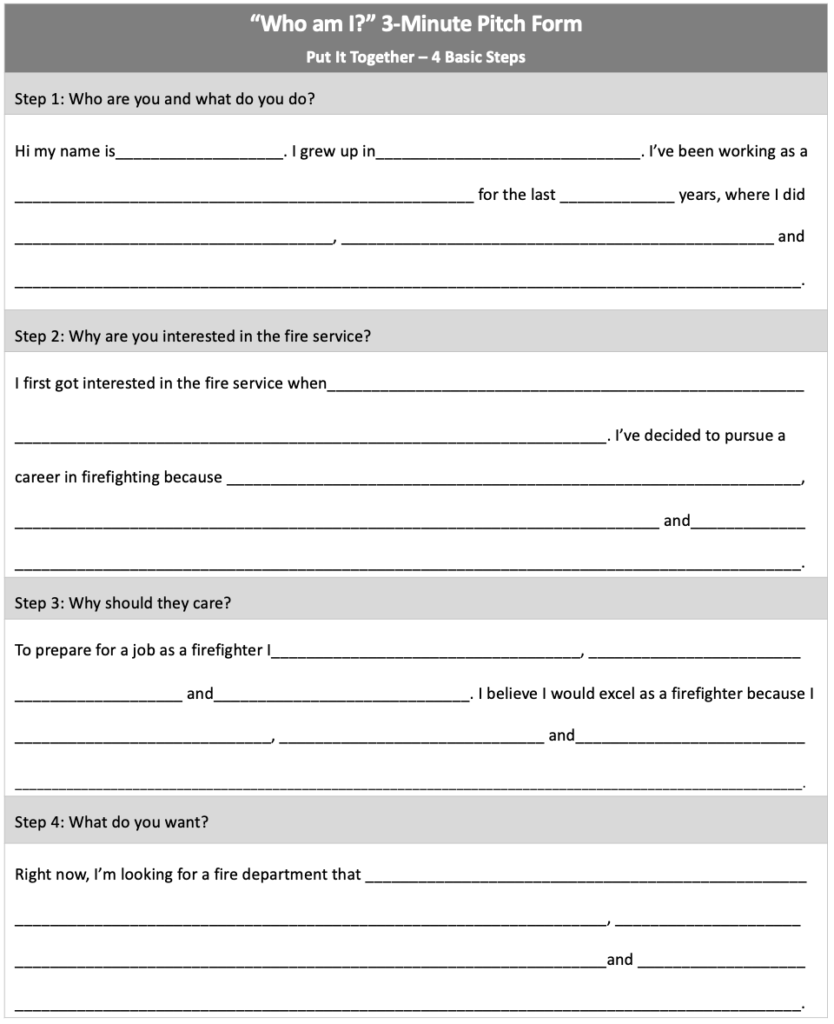
- Practice until it feels natural. Recite it while driving, in the shower, or in front of a mirror.
What to Expect During the Firefighter Oral Interview
1. Introductions
Start strong. When you walk in, confidently shake hands with each interviewer, introduce yourself, and smile. Remember their names — it shows respect and attentiveness. After introductions, it’s a great time to distribute your resume, certifications, and letters of recommendation. Bring enough copies for the entire panel.
2. “Who Are You?” Questions
This section is designed to uncover your character, drive, and compatibility with the department.
Be authentic. Share your journey, explain what drew you to the fire service, and describe how your experiences have prepared you for the role. Use real stories — not canned answers — to highlight your strengths and personal growth. Use your 3-Minute Pitch.
3. Digging Deeper
Expect follow-up questions that explore your temperament, teamwork, and red flags. Interviewers want to know:
- Can you handle stress and pressure?
- Will you fit in with the station culture?
- Are there any concerns in your background?
Answer calmly, honestly, and professionally.
4. Ethical Scenarios
You may be asked how you would respond to a morally complex or safety-related situation. Firefighters are held to high ethical standards. Make it clear you understand the importance of chain of command, integrity, and safety — and never throw others under the bus when answering.
5. Challenge Questions
Be prepared for the unexpected. Interviewers might ask off-the-wall questions to see how you think on your feet. For example:
Q: “How many pennies stacked would reach the top of the Empire State Building?”
There’s no right answer. The trick is to stay composed, reason through your answer, and demonstrate your problem-solving process.
6. The Final Question
Often, you’ll be asked: “Do you have any questions for us?”
Don’t dismiss this question — it’s another opportunity to show your interest.
Ask thoughtful questions like:
- “What are the next steps in the hiring process?”
- “What does your ideal candidate look like?”
Avoid asking about salary, benefits, or vacation at this stage.
7. Wrapping Up the Interview
End with a firm handshake, a sincere thank you, and express your enthusiasm for the opportunity. Ask about the timeline and follow up with a professional thank-you email if possible.
Want to practice? Check out these 99 free firefighter interview questions to sharpen your skills and boost your confidence.
Best Practices for Interview Day
- Don’t be late. Plan ahead, account for traffic, and aim to arrive at least 15 minutes early.
- Dress professionally. You’re representing yourself and the department. Wear a suit or business attire that shows respect.
- Bring a portfolio. Include extra copies of your resume, certifications, and letters of recommendation.
- Treat everyone with respect. You never know who has influence in the hiring decision.
- Stay calm and confident. Being humble, polite, and prepared will leave a strong impression.
Preparing for your firefighter interview is just as important as the written or physical test — and in many cases, it’s even more critical. By mastering the #1 firefighter interview trick — the 3-minute “Who Are You” pitch — and preparing for each phase of the interview, you’ll set yourself apart and move one step closer to the job offer.
Want to Master the Firefighter Exam?
If you’re serious about nailing the oral interview and landing your dream firefighter job, check out Mastering the Firefighter Exam: The Proven Path from Applicant to Top Spot on the Hiring List. This comprehensive guide breaks down proven firefighter exam tricks.
It’s your ultimate edge in a highly competitive process.



